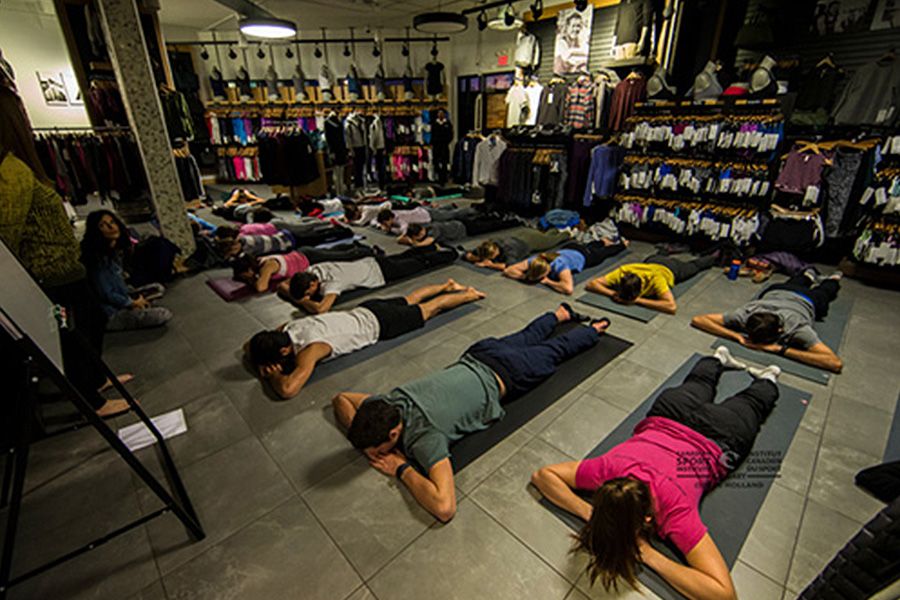To Sleep, Perchance to Win

Lying awake, staring at the clock, heart pounding, tossing, turning and worrying about not sleeping... Oh, the despair! A fitful sleep the night before a big race is disconcerting for any athlete. While this experience can be unsettling, what is more critically important when it comes to sleep is quality and duration over the long term.
According to Dr. Amy Bender, a Postdoctoral Research Fellow at the University of Calgary and Centre for Sleep and Human Performance, missing a few hours of sleep the night before competition is unlikely to impact performance. Rather, it’s the persistent lack of adequate sleep throughout a training block or whole season that can negatively affect an athlete. “Chronic deprivation is the main concern and we are trying to manage that across an entire season,” she says.
“Ongoing research points to an association between performance and sleep duration and quality,” says Dr. Bender. Studies in the literature support the link between sleep and performance. However it’s difficult to control for every variable as performance improvements can be attributed to other things, such as practice.
Jess Kryski, CSI Calgary Sport Physiologist for Canada’s Cross Country Skiing and Biathlon teams, says she’s noticed a potential association between sleep and performance with her athletes. In one instance, two athletes were going through periods of decreased sleep quality and quantity during the race season. “Their performance was not good and although we can’t attribute that just to sleep issues, it definitely seemed to play a role,” says Kryski.
The lack of recovery from training and racing due to sleep issues is challenging to overcome. In Kryski’s experience, with some athletes suffering from periods of poor sleep it didn’t matter how much their training was adjusted, she couldn’t successfully load them the way she wanted to because recovery were simply not there.
Additionally, Kryski says, “over the years working with the teams and using the monitoring tools we have, it seems that when things aren’t going well in training or racing it tends to line up with sleep quality and duration.”
Dr. Bender is the primary investigator for a number of ongoing studies examining sleep and its relationship to recovery and performance in CSI Calgary athletes. She works with athletes and teams across Canada to assess baseline sleep and the impact of sleep optimization strategies. Additionally, Dr. Bender works with teams to implement jet lag management strategies, which consist of a travel plan, both pre-trip and at the destination.
Using the Athlete Sleep Screening Questionnaire and a wrist-worn activity monitor, Dr. Bender evaluates an athlete’s typical wake and sleep habits and patterns. The athlete will then implement sleep optimization strategies, for example more nighttime sleep, naps and reducing exposure to blue light before bedtime.
Finally, Dr. Bender will assess athlete sleep during the optimization period and compare it to the baseline. While sleep duration is typically measured with the wrist-worn activity monitor, sleep quality is primarily a subjective measurement achieved via questionnaires. Data is currently being analyzed and preliminary results indicate less reported fatigue and improved moods, as well as improved satisfaction with sleep quality during the optimization phase as compared to baseline.
One of the most challenging habits for athletes to change is their exposure to blue light from electronic devices in the hours before bedtime, which can negatively impact sleep. “The blue light tells our brain to wake up, which can impact how long it takes to fall asleep and waking up during the night,” says Dr. Bender. “It decreases melatonin secretion, the hormone that makes you sleepy at night.”
During the sleep optimization phase, athletes are instructed to use blue blocking glasses that block out 99% of the blue light from screens. This can reduce its negative effects on sleep for athletes who are exposed to screen time in the two hours before bedtime.
Ultimately, the goal of Dr. Bender’s research is to improve performance through better sleep. It represents another piece of the puzzle in the quest to enable athletes to achieve their potential in sport. To sleep, perchance to win!
Canadian Sport Institute Calgary: @csicalgary
Written by Kristina Groves: @kngrover
Photo by Dave Holland: @csicalgaryphoto
26/10/16
Sport Science Solutions, Cross-Country Ski Canada, Canadian Sport Institute Calgary Team, Biathlon Canada, Jessica Kryski, Sleep, Sleep for Performance
